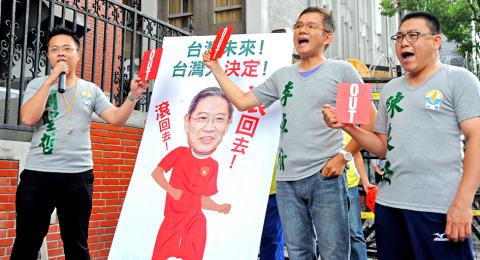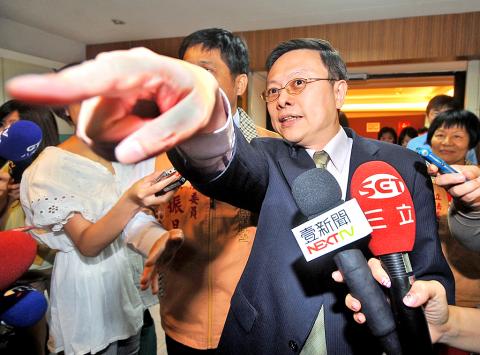Pro-Taiwanese independence activists yesterday demanded that the Mainland Affairs Council vow that Minister Wang Yu-chi (王郁琦) will meet China’s Taiwan Affairs Office (TAO) Director Zhang Zhijun (張志軍) on a state-to-state basis, rather than under the “one China” framework, a policy formulated by Beijing that the said is accepted by President Ma Ying-jeou’s (馬英九) administration.
Ahead of Zhang’s planned arrival today, dozens of students who participated in the Sunflower movement staged a protest outside the council building in Taipei yesterday along with Alliance of Referendum for Taiwan convener Tsay Ting-kuei (蔡丁貴) to voice their concerns that cross-strait political talks may take place during Zhang’s visit.
Chanting: “No sovereignty, No [political] talks,” the protesters demanded that Wang issue a declaration when he meets with his Chinese counterpart this afternoon that clearly states: “Taiwan is a sovereign, independent nation.”

Photo: Liu Hsin-de, Taipei Times
The activists said they do not oppose the idea of holding cross-strait negotiations on economic or political issues, they are only against such talks being held under the “one China” framework.
“Before Wang is able to make the government’s position on Taiwan’s independence and sovereignty clear, he is in no position to meet with Zhang,” National Taiwan University student Lin Yu-lun (林于倫) said.
Lin said that any negotiations the government engages in with any other country, including China, should be based on a state-to-state relationship because Taiwan is an independent nation.

Photo: Fang Pin-chao, Taipei Times
National Taipei University student Lai Pin-yu (賴品妤) urged Wang to set a precondition for his meeting with Zhang stipulating that China first improve its human rights situation.
During Zhang’s four-day trip, he is scheduled to visit Aborigines in New Taipei City’s Wulai District (烏來) and residents of the Siadin Village (小林村) in Greater Kaohsiung devastated by Typhoon Morakot, which Lai said was part of a bid to create an image that he is “man of the people.”
“However, we should first look at how Beijing has treated Tibetans,” she said.
At the protest, the activists’ tried to give a letter of appeal to the council, but it did not send council Chief Secretary Jeff Yang (楊家駿) to receive until the demonstrators tried to burst into the complex.
The activists tried to breach the complex after being frustrated when the mistook Wu Chia-hsin (吳家興), director of the council’s Ethics Department, for a low-ranking official when he came down to listen to their appeal.
When Yang appeared, the protesters peppered him with questions about Taiwanese sovereignty, but he deigned to make any promises, saying only that he would pass the letter of appeal on to Wang.
Meanwhile, Democratic Progress Party (DPP) Department of China Affairs director Chao Tien-lin (趙天麟) yesterday said the party viewed at Zhang’s visit as positive move and that it has no plans to mobilize any protest.
The party issued a three-point statement on the trip which said that it encourages cross-strait interactions on the conditions that Taiwan’s sovereignty is respected, and that fairness and democracy are upheld.
The statement’s first point is that any political dealings that take place during these interactions must be done transparently and the agendas of all relevant meetings made public.
Second, the nation’s future should be decided by its 23 million citizens and no one else and Ma must not ignore that fact.
Third, since Zhang hopes to learn about Taiwan and communicate with Taiwanese of all social ranks, especially average citizens, the DPP said it hoped he would “listen to them with his heart.”

Chinese Nationalist Party (KMT) Chairman Eric Chu (朱立倫), spokeswoman Yang Chih-yu (楊智伃) and Legislator Hsieh Lung-chieh (謝龍介) would be summoned by police for questioning for leading an illegal assembly on Thursday evening last week, Minister of the Interior Liu Shyh-fang (劉世芳) said today. The three KMT officials led an assembly outside the Taipei City Prosecutors’ Office, a restricted area where public assembly is not allowed, protesting the questioning of several KMT staff and searches of KMT headquarters and offices in a recall petition forgery case. Chu, Yang and Hsieh are all suspected of contravening the Assembly and Parade Act (集會遊行法) by holding

PRAISE: Japanese visitor Takashi Kubota said the Taiwanese temple architecture images showcased in the AI Art Gallery were the most impressive displays he saw Taiwan does not have an official pavilion at the World Expo in Osaka, Japan, because of its diplomatic predicament, but the government-backed Tech World pavilion is drawing interest with its unique recreations of works by Taiwanese artists. The pavilion features an artificial intelligence (AI)-based art gallery showcasing works of famous Taiwanese artists from the Japanese colonial period using innovative technologies. Among its main simulated displays are Eastern gouache paintings by Chen Chin (陳進), Lin Yu-shan (林玉山) and Kuo Hsueh-hu (郭雪湖), who were the three young Taiwanese painters selected for the East Asian Painting exhibition in 1927. Gouache is a water-based

Taiwan would welcome the return of Honduras as a diplomatic ally if its next president decides to make such a move, Minister of Foreign Affairs Lin Chia-lung (林佳龍) said yesterday. “Of course, we would welcome Honduras if they want to restore diplomatic ties with Taiwan after their elections,” Lin said at a meeting of the legislature’s Foreign Affairs and National Defense Committee, when asked to comment on statements made by two of the three Honduran presidential candidates during the presidential campaign in the Central American country. Taiwan is paying close attention to the region as a whole in the wake of a

OFF-TARGET: More than 30,000 participants were expected to take part in the Games next month, but only 6,550 foreign and 19,400 Taiwanese athletes have registered Taipei city councilors yesterday blasted the organizers of next month’s World Masters Games over sudden timetable and venue changes, which they said have caused thousands of participants to back out of the international sporting event, among other organizational issues. They also cited visa delays and political interference by China as reasons many foreign athletes are requesting refunds for the event, to be held from May 17 to 30. Jointly organized by the Taipei and New Taipei City governments, the games have been rocked by numerous controversies since preparations began in 2020. Taipei City Councilor Lin Yen-feng (林延鳳) said yesterday that new measures by